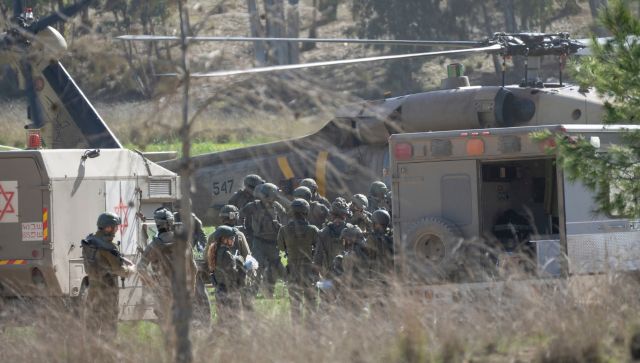Israeli cabinet minister and former military chief Gadi Eizenkot said that only a cease-fire deal can win the release of dozens of hostages held by Hamas in Gaza. Eisenkot said that those claiming hostages could be freed through military pressure were spreading illusions. The former army chief’s comments, broadcast on Israel’s Channel 12 television station late Thursday, were the latest sign of a growing rift among political and military leaders over the direction of Israel’s war on Hamas. Eizenkot, whose youngest son was killed in fighting in the Gaza Strip last month, also said the fate of the hostages should take priority over other war aims, even if that meant missing out on an opportunity to take out the political leader of Hamas. Across the Gaza Strip, Hamas terrorists are putting up stiff resistance. The conflict, now in its fourth month and showing no sign of ending, has also inflamed tensions across the Middle East. Asked if the hostages could be released in a rescue mission similar to the 1976 operation that freed around 100 hostages in Entebbe, when Israeli commandos flew into Uganda at nightfall, he said it was unlikely to happen. “The hostages are scattered in such a way - even underground - that the likelihood (of such an operation) is extremely low,” Eizenkot told the Channel 12 programme Uvda. “We are still making efforts and looking for every opportunity but the likelihood is low and to say that this is how it will happen is to sow an illusion.” While more than 100 of the hostages seized during Hamas’ cross-border rampage into southern Israel on Oct. 7 were freed during a short-lived November truce, Israel says 132 remain in Gaza and that 27 have died in captivity. “I think it is necessary to say boldly that it is impossible to bring the hostages back alive in the near future without a deal,” Eizenkot said in the interview. Israel has bombarded the Gaza Strip in an air, ground and sea offensive designed to free the hostages and eradicate Hamas from the enclave since the shock attack that killed 1,200 mostly civilians. Nearly 25,000 Palestinians have been killed in the strikes on Gaza, the Gaza health ministry says. Asked whether harm to hostages must be avoided even if it means missing an opportunity to hit the political leader of Hamas in Gaza, Yahya Sinwar, Eizenkot replied: “The answer is yes.” But he added that the broader war aims would “still be valid” after any temporary ceasefire. His interview, which was filmed at an earlier date but broadcast on Thursday evening, came hours after Prime Minister Benjamin Netanyahu told a press conference that Israel would not accept anything less than total victory over Hamas. The wider region is also teetering dangerously toward a major escalation, with the Israel-Lebanon frontier seeing daily fighting. Eizenkot, a war cabinet minister, said he had convinced officials in the grouping to hold off any attack on Hezbollah in Lebanon in the days after the Hamas attack. “I think our presence there prevented Israel from making a grave strategic mistake,” he said. Both Israel and Hezbollah have signalled they want to avoid war, but both say they are ready to fight if necessary. Gaza’s Health Ministry says more than 24,400 Palestinians have died, and the United Nations says a quarter of the 2.3 million people trapped in Gaza are starving. In Israel, around 1,200 people were killed during the Oct. 7 attack by Hamas that sparked the war and saw some 250 people taken hostage by militants. With inputs from Reuters.
Across the Gaza Strip, Hamas terrorists are putting up stiff resistance. The conflict, now in its fourth month and showing no sign of ending, has also inflamed tensions across the Middle East.
Advertisement
End of Article


)

)
)
)
)
)
)
)
)



